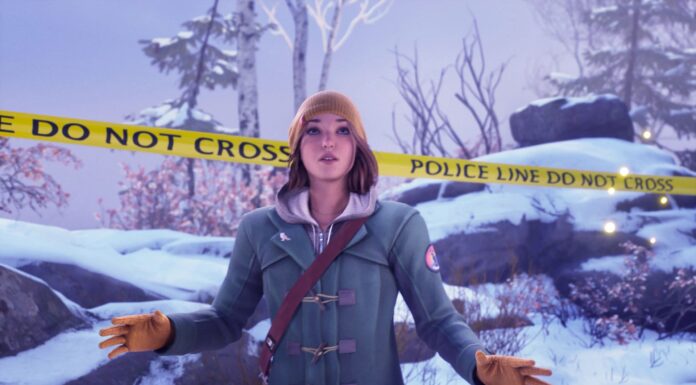Before I begin this review, let me make one thing abundantly clear:
I have all the reasons in the world to be biased toward loving this game.
I’ve met Bill and Amanda Gardner (the developers) on a few occasions and have had wonderful conversations with each of them–they’re incredibly nice people if you ever get the pleasure of meeting them. Bill Gardner, as some of you may recall, was heavily involved in the production of what happens to be my favorite video game of all-time: Bioshock (as well as my other favorite, Bioshock Infinite). I was given my copy of Perception through Bill Gardner as a review copy. I’m very good friends with one of the interns who worked on this game. It’s a game that takes place right by Boston, MA–where I lived off and on for the past 5 years. It’s a game about a blind girl–I myself, though not completely blind, am legally blind (I can’t see more than about an arm’s length away from my face. Everything else is too blurry. Glasses help a bit, but they only do so much. At most, I can see an arm and a half’s length from my face.) and can’t recall another game with a protagonist I’ve related to on this kind of a level (read: Representation MATTERS).
Again, I have all the reasons in the world to be in love with this game. I am, however, looking past my biases for the sake of this review to be as fair as I possibly can be. But if, at any point, you read this and think I’m being overly zealous or overly critical, those biases are exactly why: Where this game succeeds, I want everyone else to know so that they feel more encouraged to play it if they haven’t already done so. And where this game fails, I want nothing more than to see it improve. I’d love to see this game build upon itself and improve (as there is certainly room for improvement). Which is why, again, I want to make my biases known now: So 1. Everyone knows 2. Anyone reading this and thinking that I’m being a bit over-the-top knows that I say everything I say from a place of love.
Also worth knowing is that I played the PS4 version of Perception–therefore, anything I praise or complain about might not necessarily reflect the PC or X-Box One versions (I say this thinking specifically about technical issues, since they tend to be exclusive to the platform one plays a game on).
Now that we know all that, let’s begin at the beginning: For those of you unaware, Perception is Deep End Game’s premiere indie game. With a team comprised of former Bioshock and Dead Space devs, there were many high hopes for Perception. You play as a blind girl named Cassie using echolocation to navigate through a haunted estate, looking for items you’ve found in your nightmares. You’ll learn about what drove you to the estate, what kind of evil presence is hunting you and why, and the stories of the former owners and their abnormal, often gruesome deaths.

There aren’t many things in this world quite as scary as the inability to see. You’re unaware of your surroundings, anything (or anyone) could be around you and you’d be none the wiser. There are some ways around it (like echolocation!) but on the whole, it can be terrifying. It’s a special kind of fear–one that we often don’t think about in regards to video games because of the obscene difficulty presenting the player with blindness could be. Enter Perception, a love letter to this deeper level of otherwise largely unacknowledged fear.
From a conceptual standpoint, Perception is brilliant in its originality and aspiration toward this deeper level of horror. Combined with some stellar sound design that outranks even most triple-A games and a story that keeps you just interested to go even deeper, Perception could so easily be one of the finest indie horror games to grace the genre. Unfortunately, in its current state, it’s being held back by some rather prominent technical issues.
I suspect that this is an issue exclusive to the PS4 version, but there were 2 points in the game where I died (Ch.2, right after you get the password to the downstairs room and Ch.3, trying to avoid the dolls and getting back downstairs). Each time, the game respawned me in an area that made progress physically impossible–meaning I had to close the game completely and restart it. This wouldn’t be as much of an issue if it weren’t for the fact that the autosaves in this game (it’s a horror game, after all, so no manual saving) weren’t so spaced out and only happened every 2-4 goals you’d achieve. Meaning that any unexpected setback could put you up to half an hour at most behind.
Although the autosaves in this game leave a lot to be desired, it’s also worth noting that Perception isn’t a difficult game by any stretch of the imagination, so odds are that the autosaves won’t be an issue anyways. I’d argue, in fact, that it’s too simple. There’s a mysterious Presence in the estate that’s hunting you–at least, that’s what the game leads you to believe. Bar a few points where it appears for story progression, you’ll very rarely run into it unless you’re hitting your cane everywhere on everything. It takes away greatly from the suspense that the game otherwise builds up beautifully through its atmosphere and storytelling.
While we’re on the topic of atmosphere, let’s talk about it: As you’d expect from Bioshock and Dead Space devs, the atmosphere in Perception is jaw dropping. From the aforementioned stellar sound design to the variations of the estate that occur everytime you begin a story of one of the previous owners, the estate at Echo Bluff, while static in its actual layout, offers enough variety in the environments of the house to paint an incredible picture of the kind of people currently living in the estate. You wouldn’t expect a game about a blind protagonist to put such heavy attention to this kind of visual detail, but in this respect, Perception 100% delivers.
We’ve come this far without talking about gameplay, which is very creative, and practically made for any fans of Daredevil who might be out there. Some of you may have been wondering why you, playing as Cassie, are able to “see” things despite being blind. The short answer is, you’re not. You’re using Cassie’s mind’s eye, you’re using a technique called echolocation. Essentially, it’s making your hearing so keen that by simply tapping your cane around, you recognize sounds and can get a good idea about what and where the item is. And yes, it’s a real thing. In the otherwise dark estate, you’ll use the sounds around you–usually your cane–to piece together a map of the estate. While doing this, you’re trying to find out what happened to the previous owners and subsequently finding items that Cassie has seen in her nightmares, each of which represent one of the stories. Make too little noise and navigation becomes very difficult. Make too much noise and the Presence will come after. As I mentioned earlier, the Presence actually quite rarely shows up unless you’re seriously abusing the echolocation, but that matter aside since it’s already been addressed, I find the concept of using echolocation in a game to be absolutely incredible. As a heavily visually impaired person myself (as I mentioned earlier, if it’s more than an arm’s length from my face I can’t see it), it makes me wonder if it’s possible to play this game using real-life echolocation (I mean, the sound design is pretty stellar, after all).
More than anything else, Perception is a game filled to the brim with love. A lot of research was put into this game to portray blindness and echolocation as accurately as possible. (If you read the interview with Amanda Gardner posted here a while ago, you’ll know that Bill Gardner actually wrote his grad school thesis on blindness and adaptive technologies!) Without spoiling the end, I’ll also mention that the game’s ending is a blatant token of love from Bill Gardner to his ancestors. Perception is a surprisingly heartwarming game, despite being a horror game. It’s polarizing (and admittedly, does come out of no where and I would’ve liked to see maybe 1 or 2 subtle hints that it was going to take the direction it took) but in a way you wouldn’t expect it to be–and I don’t think that’s a bad thing since it came from a place of blatant love.
What Perception succeeds in most is the feeling of helplessness from not being able to see around you. The kind of fear that it can incite, and how you’ll learn to live with it. Some might argue that you shouldn’t be able to see in this game period because, well, you’re blind but I argue back that when you’re visually impaired, you want to alleviate it as much as you can and overtime, you’ll learn tricks to make it seem like you can see–tricks like echolocation. Given that Cassie’s been blind since birth and is definitely a confrontational character, it’s highly unlikely that she would just accept her blindness with a shrug–no, she’d want to do everything in her power to make it work out as much as possible by utilizing something like echolocation, which for me (and again, maybe this is because I’m also visually impaired) makes it feel more authentic and more relatable (go ahead, ask me about how great I am at recognizing the blurry outlines of shapes).
Where Perception fails the most is in the degree of patience you need to give this game. If you die, you’re probably going to be set back up to half an hour behind. You might not die because the Presence so rarely visits you when it’s not a scripted event, which greatly diminishes the suspense. The writing and the stories are good, but not among indie horror’s absolute best. And of course, if limited vision is going to be an issue for you and you don’t have the patience to deal with it, you simply won’t enjoy the game plain and simple (after all, that’s the whole point of the game! For some it’s its greatest asset, for others its greatest weakness). You shouldn’t pick up Perception thinking it’s the kind of game you can sit down and plow through in one sitting. Frankly, it’s not. I think 2-3 would be ideal, so as to give you time to collect yourself.
In its current state, I would give Pereception a 7/10 because, at the end of the day, it’s very frustrating dying and being set back substantially because of the poor autosaving. If those technical issues were removed, though (removing the glitches, making the game autosave every 1-2 goals achieved) it’s easily a 9/10 for me (not quite a 10 because of the unclear purpose of the Presence, which really does hurt the suspense in the game). I want so badly for this game to be the best it possibly can.
Pereception is brilliant, point blank. Unfortunately, perhaps because its goals were so lofty, it seemed to bite off more than it could chew and sacrificed some technical soundness and a more traditional sense of fear (the lack of presence by the Presence) for conceptual genius and innovation in defining horror. If you like more experimental kinds of horror games, Pereception is 100% worth trying as long as you’re patient with it. If you like games that are innovative and try a lot of new things, Perception couldn’t be more right for you. But if you want a more traditional survival horror game with a narrative, Perception may or may not be for you depending on how much patience you’re willing to give it. If you allow it your patience though, I promise you that if nothing else, you can safely say that you’ve never played anything else like it.
















